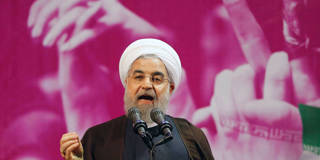Iranian President Hassan Rouhani is expected to win re-election this May, because he has generally done what he said he would do, and because every president of the Islamic Republic before him has served two terms. But if he loses, he can blame his harsh economic policies, which delivered too little, too late.
CAMBRIDGE – For a “managed democracy,” Iran holds remarkably unpredictable presidential elections. And the upcoming election on May 19 is no exception, given that the incumbent, Hassan Rouhani, is facing a tough conservative challenger.
Rouhani’s opponent, Ebrahim Raisi, is ahigh-ranking cleric who is considered to be a possible successor to Iran’sSupreme Leader, Ayatollah Ali Khamenei. Raisi’s campaign has received a boostfollowing the withdrawal of another hardliner, Mohammad Bagher Qalibaf, the mayorof Tehran, who garnered one-third as many votes as Rouhani in the 2013 election.
When Rouhani was elected in 2013, Iran was suffering from 35% inflation, the national currency had depreciated by two-thirds in the previous year, and international sanctions were crippling the economy. Oil exports and output of automobiles – Iran’s leading manufacturing industry – had each declined by two-thirds, and restless industrial workers were demanding back pay.



CAMBRIDGE – For a “managed democracy,” Iran holds remarkably unpredictable presidential elections. And the upcoming election on May 19 is no exception, given that the incumbent, Hassan Rouhani, is facing a tough conservative challenger.
Rouhani’s opponent, Ebrahim Raisi, is ahigh-ranking cleric who is considered to be a possible successor to Iran’sSupreme Leader, Ayatollah Ali Khamenei. Raisi’s campaign has received a boostfollowing the withdrawal of another hardliner, Mohammad Bagher Qalibaf, the mayorof Tehran, who garnered one-third as many votes as Rouhani in the 2013 election.
When Rouhani was elected in 2013, Iran was suffering from 35% inflation, the national currency had depreciated by two-thirds in the previous year, and international sanctions were crippling the economy. Oil exports and output of automobiles – Iran’s leading manufacturing industry – had each declined by two-thirds, and restless industrial workers were demanding back pay.